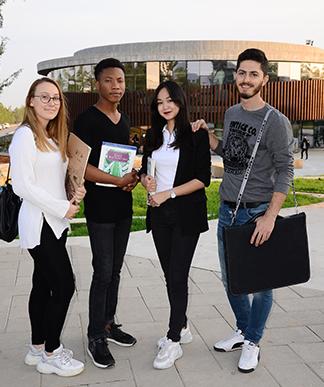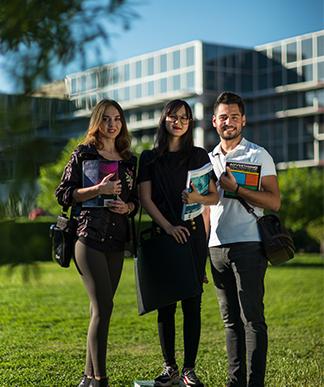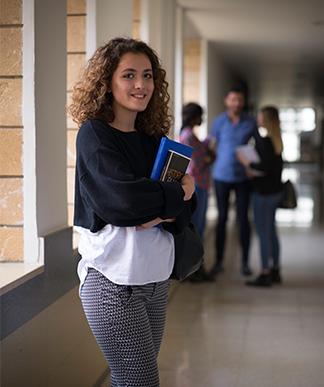


About the Program
The Public Relations and Advertising Program, by means of focusing on a communication profession, aims to educate professionals who will communicate effectively; form communication bonds with the public and private sectors; be able to respond to the communication needs of the changing business world; and maintain human-centered long-term relationships. The program offers theoretical, technical and communicative competence courses, as well as internship for practical experience. The internship helps students apply learned knowledge into real business cases in a real working environment, fostering self-confidence and interpersonal communication competences. The internship period is 30 business days and can be carried out either with local or international organizations depending on the student’s preference. Our program aims to contribute to the growth of our students as professionals in the field of communication and mass communication with enriched knowledge and skills to be able to respond to the needs of the sector. The medium of instruction of the program is English.
Education Opportunities
Specialists are invited from various institutions and organizations related to the field of public relations and advertising aiming to reinforce the learning outcomes of students beyond the scheduled curriculum through talks, presentations and seminars. Through these extra-curricular organizations, students are exposed to real business cases and successful experiences of the presenters. This gives students an opportunity to benefit from the presenters’ know-how and expertise. Interactive meetings help students understand the importance of interpersonal communication, time-management, and collaboration with staff in the workplace. By becoming active participants of the Advertising and Public Relations Club, students are also able to gain practical experience in organizing various activities, designing different advertising and public relations campaigns. Additionally, students can take on responsibility in the CIU News Agency and television studio and improve their written and visual expression skills. Students, after graduation, may continue for an additional two-year education in order to obtain undergraduate degree from the Department of Advertising and Public Relations.

Career Areas
Students who successfully graduate from the Public Relations and Advertising Program have a wide range of business opportunities. Public relations profession requires effective communication management; so, the graduates have the opportunity to serve in communication-oriented positions at both public and private institutions. Despite the fact that communication methods and their influence are changing in parallel to the technological developments in the field; communication attributes and purposes do not change. Thus, there always will be a high demand for public relations and advertising professionals in the business arena. Graduates of the Public Relations and Advertising Program can easily apply to public relations companies and advertising agencies; may enroll in corporate communication and marketing departments of institutions, civil society organizations, political institutions, and various media organizations. Students who have mastered public relations and advertising in English language have more opportunities for employment at international advertising agencies.
Contact
Vocational School
Science and Technology Center, ST256
Tel: +90 392 671 1111 Extension:2751
School E-mail: secretary-voc@ciu.edu.tr
Director E-mail: dkaragozlu@ciu.edu.tr
Compulsory Courses
First Semester
INTRODUCTION TO MASS COMMUNICATION
Course code
CMMS101Credit
3Theoretical
3Practical
0Ects
6MEDIA LITERACY
Course code
CMMS133Credit
3Theoretical
3Practical
0Ects
6READING AND WRITING SKILLS-I
Course code
ENGL141Credit
3Theoretical
2Practical
2Ects
4ESSENTIALS OF MARKETING
Course code
MRKT103Credit
3Theoretical
3Practical
0Ects
7INTRODUCTION TO PUBLIC RELATIONS
Course code
PRAD111Credit
3Theoretical
3Practical
0Ects
6TURKISH LANGUAGE
Course code
TREG100Credit
0Theoretical
2Practical
0Ects
2TURKISH
Course code
TURK100Credit
0Theoretical
2Practical
0Ects
2Second Semester
INTRODUCTION TO NEW MEDIA
Course code
CMMS104Credit
3Theoretical
3Practical
0Ects
6HISTORY OF CIVILIZATION
Course code
HIST100Credit
0Theoretical
2Practical
0Ects
2INTRODUCTION TO COMPUTERS
Course code
ITEC110Credit
3Theoretical
3Practical
0Ects
4INTRODUCTION TO ADVERTISING
Course code
PRAD112Credit
3Theoretical
3Practical
0Ects
5PSYCHOLOGY
Course code
PSYC110Credit
3Theoretical
3Practical
0Ects
6MODERN TURKISH HISTORY
Course code
TARH100Credit
0Theoretical
2Practical
0Ects
2UNIVERSITY ELECTIVE
Course code
UNIEXX1Credit
3Theoretical
3Practical
0Ects
6Third Semester
BASIC PHOTOGRAPHY
Course code
COMM331Credit
3Theoretical
2Practical
2Ects
6FREE ELECTIVE
Course code
FREEXX1Credit
3Theoretical
3Practical
0Ects
5SUMMER TRAINING
Course code
PRAD100Credit
0Theoretical
0Practical
0Ects
5PRODUCTION TECHNIQUES IN ADVERTISING
Course code
PRAD311Credit
3Theoretical
2Practical
2Ects
4CAMPAIGN DESIGN IN PUBLIC RELATIONS
Course code
PRAD313Credit
3Theoretical
2Practical
2Ects
6AREA ELECTIVE
Course code
PRADXX1Credit
3Theoretical
3Practical
0Ects
5Fourth Semester
CREATIVITY IN ADVERTISING
Course code
PRAD324Credit
3Theoretical
2Practical
2Ects
6CAMPAIGN DESIGN IN ADVERTISING
Course code
PRAD332Credit
3Theoretical
2Practical
2Ects
7AREA ELECTIVE
Course code
PRADXX2Credit
3Theoretical
3Practical
0Ects
5Area Elective
Course code
PRADXX3Credit
3Theoretical
3Practical
0Ects
5UNIVERSITY ELECTIVE
Course code
UNIEXX2Credit
3Theoretical
3Practical
0Ects
6Elective Courses
PUBLIC ADDRESS
Course code
PRAD122Credit
3Theoretical
3Practical
0Ects
BASIC PHOTOGRAPHY-I
Course code
CMMS231Credit
3Theoretical
2Practical
2Ects
6TRNC Applicants
TRNC citizens and TR citizen candidate students who have completed their entire high school education in TRNC. They are placed in undergraduate programs in line with their success in the CIU Student Placement and Scholarship Ranking Exam and the programs they prefer.
Students who are successful in the exam can register from the TRNC Marketing Office.
You can directly apply online to our undergraduate programs by using the application portal. Please fill in your details correctly and upload all the required documents listed on the last page of the application form.
Required documents;
- Completed application form,
- Higher/Secondary Certificate or equivalents (e.g. O/A’Level, WAEC/NECO)
- Evidence of English Language competence: TOEFL (65 IBT) or IELTS (5.5). Students without these documents will take the CIU English proficiency exam on campus following arrival,
- Scanned copy of international passport/birth certificate,
- Fully completed and signed CIU Rules and Regulations document (which can be downloaded during the online application).
Cyprus International University provides academic scholarships for its students as an incentive for success, with most students benefiting from 50%, 75% or 100% scholarships or discounted tuition fees. Click for more information.
Tuition Fees are determined at the beginning of each academic year. Candidate students who are entitled to enroll in CIU can learn their fees in line with the Tuition Fee Calculation system.